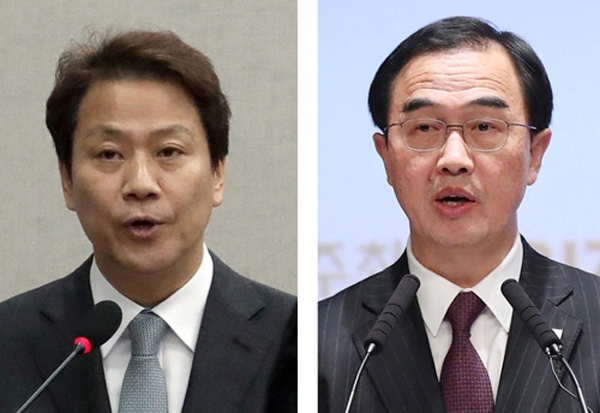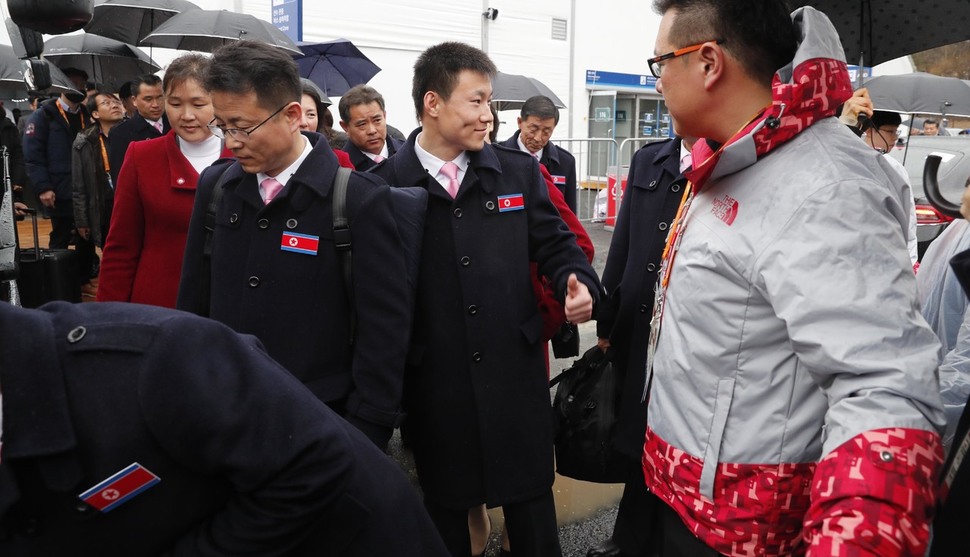 |
|
Blue House Chief of Staff Im Jong-seok (left), who will lead the inter-Korean summit preparatory committee, and Unification Minister Cho Myoung-gyon.
|
The date, protocol, and summit agenda are all items which need to be finalized
Following the appointments of the members of the preparatory committee for the inter-Korean summit led by Blue House Chief of Staff Im Jong-seok, and the scheduling of the committee’s first meeting on Mar. 16, attention is focusing on what role the committee will play in the future. To start with, the committee needs to carry out technical discussions with North Korea to finalize the exact date for the summit between South Korean President Moon Jae-in and North Korean leader Kim Jong-un, which is supposed to take place at the end of April, to ensure the summit goes smoothly. Another likely focus for the committee is arranging the protocol of the summit and the agenda that Moon and Kim will discuss. Since this summit will be held in the Panmunjeom Joint Security Area – unlike the previous two summits, which were held in Pyongyang – and since relatively little time remains, the two sides are likely to concentrate on the basic agenda of the summit. The agenda of the meeting that the preparatory committee will be drafting is likely to be considerably different from the two previous summits. Since South and North Korea have exchanged special envoys and because there is already some degree of understanding between the two leaders, the breadth and depth of the agenda cannot be the same as before, experts contend. “The agenda of this summit, unlike those of the past, will include not only matters related to inter-Korean relations but also the denuclearization of the Korean Peninsula, the peace treaty and talks to declare the end of the Korean War,” predicted Kim Yong-hyun, professor at Dongguk University. “The key of these talks is to institutionalize South and North Korea’s peaceful coexistence,” asserted Koo Kab-woo, professor at the University of North Korean Studies. Koo thinks that the two sides should be moving toward a basic agreement that could go beyond the one reached in 1991 between South Korean president Roh Tae-woo and North Korean leader Kim Il-Sung. “North Korea never used to talk with the South about the nuclear issue, but its attitude has changed. It’s also worth drawing up a basic declaration about the denuclearization of the Korean Peninsula,” Koo said. Blue House intends to discuss denuclearization and a permanent peace treaty The Blue House also made clear on Mar. 15 that the inclusion of a large number of key diplomats and security officials on the preparatory committee signified its intention of dealing with fundamental issues including denuclearization and a permanent peace treaty. Since the inter-Korean summit in April precedes the summit between Kim and US President Donald Trump, which is supposed to be held in May, Kim and Moon need to exchange their opinions in one way or another about the longstanding American demand for the denuclearization of the Korean Peninsula. These predictions are made even more credible by the fact that ministries related to the economy, which played a considerable role in preparing for the two previous summits, have been left out of this preparatory committee. “This is a technical meeting being held in Panmunjeom ahead of Kim and Trump’s summit, and Moon and Kim are perfectly capable of meeting again in the future. If there is progress toward a peace treaty and denuclearization of the Korean Peninsula, there could certainly be a discussion of economic issues in a subsequent summit,” said an expert on inter-Korean relations who asked to remain anonymous. The implication is that, if a big-picture understanding is reached on fundamental issues such as denuclearization and a peace treaty and if progress is assured in Trump and Kim’s subsequent summit, the issue of economic cooperation can be dealt with in detail at a future summit. After announcing the members of the preparatory committee, which will be chaired by Blue House Chief of Staff Im Jong-seok and supervised by Unification Minister Cho Myoung-gyon, Blue House spokesperson Kim Eui-kyum said, “The first plenary session will be held at the Yeomingwan wing of the Blue House on Mar. 16.” “The committee will be composed of National Security Advisor Chung Eui-yong, Blue House Chief Policy Advisor Jang Ha-seong, Foreign Minister Kang Kyung-wha, Defense Minister Song Young-moo, National Intelligence Service Director Suh Hoon and Minister of Government Policy Coordination Hong Nam-ki, and the committee will oversee subcommittees on the agenda, on communication and promotion, and on operational support,” Kim Eui-kyum added.
 |
|
North Korean Paralympic cross country skier Kim Jong-hyun gives a thumbs-up as he leaves the Paralympic Athletes Village in Pyeongchang, Gangwon Province to return to North Korea on Mar. 15. (by Park Jong-shik, staff photographer)
|







